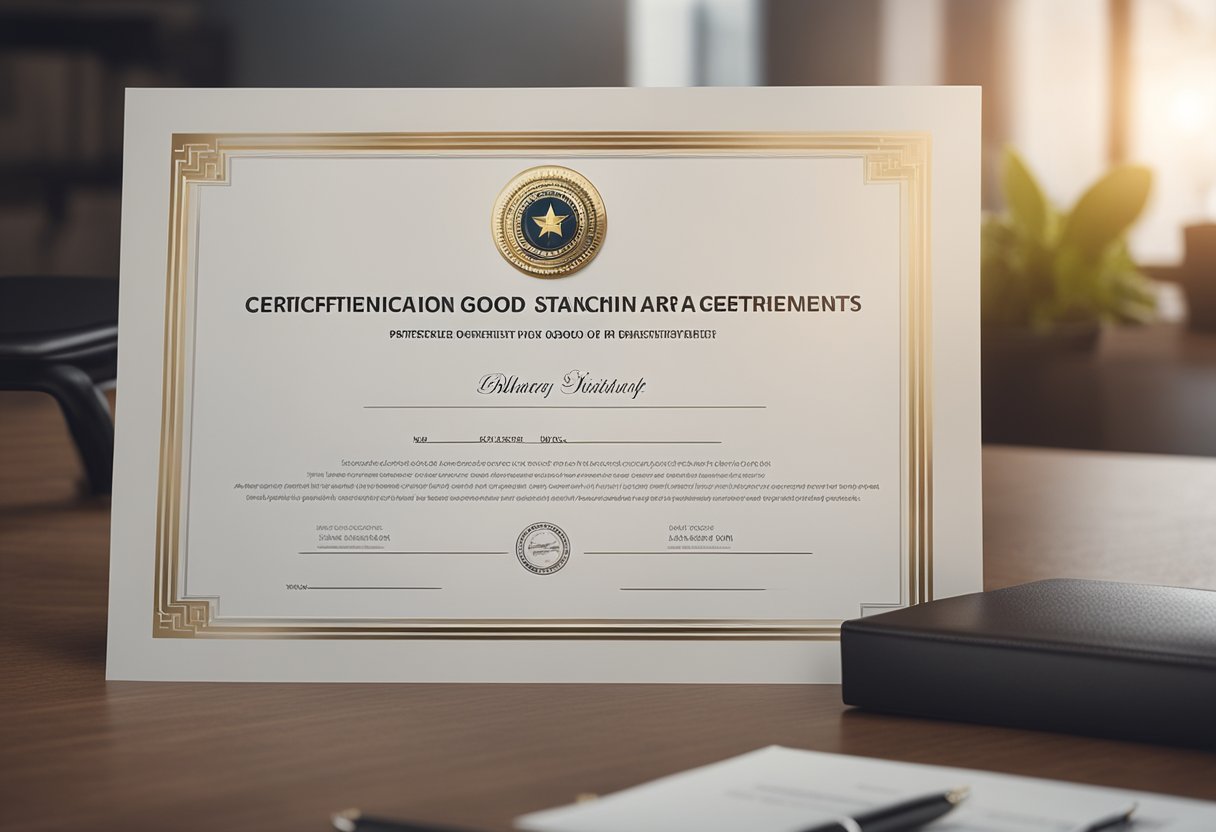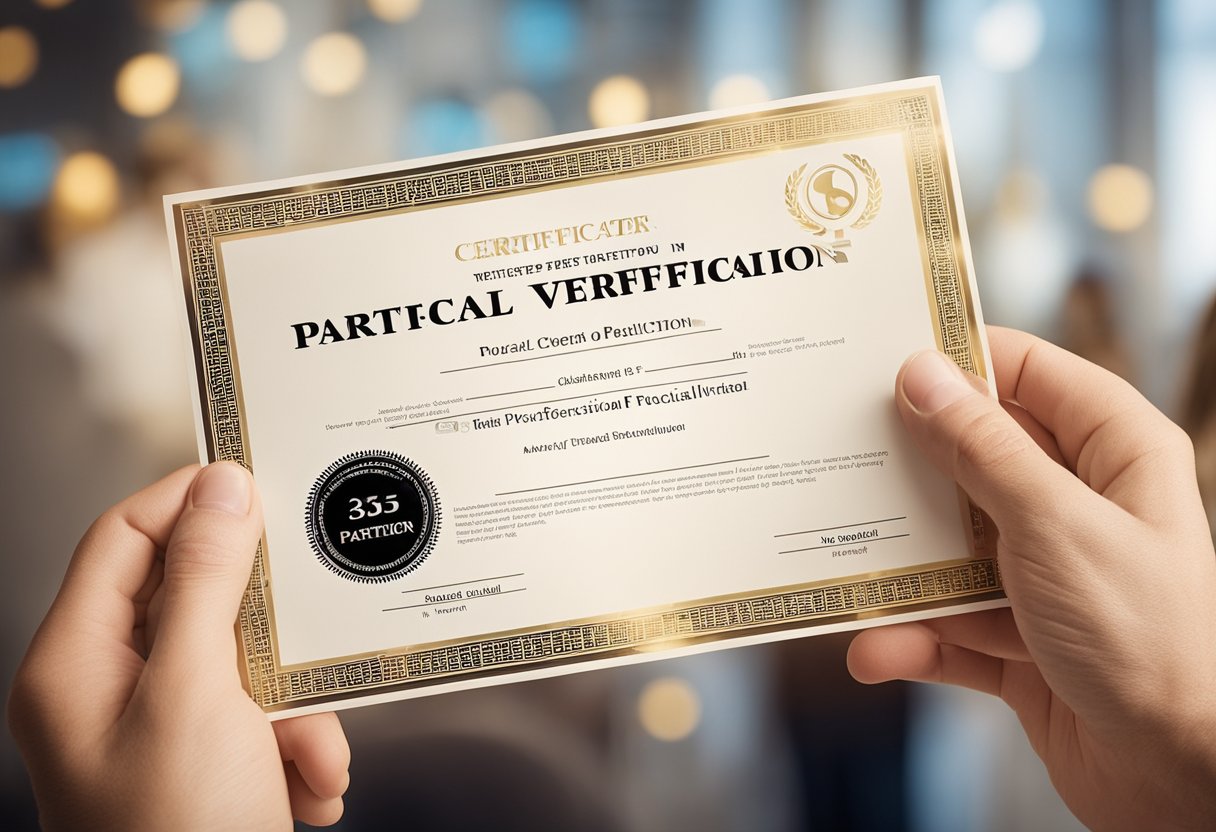Partnering up with another business can be a great way to expand your own company’s reach and capabilities. However, before entering into any kind of partnership, it is important to verify the status of your potential partner. One way to do this is by obtaining a Certificate of Good Standing.

A Certificate of Good Standing is a document that verifies that a business entity is in compliance with all necessary state requirements and has paid all required fees and taxes. It is often required by banks, investors, and other entities before entering into any kind of business transaction with another company. By obtaining a Certificate of Good Standing, you can ensure that your potential partner is trustworthy and has a track record of success.
By taking the time to verify your potential partner’s status with a Certificate of Good Standing, you can set yourself up for success. Not only does it help establish trust between the two companies, but it also sets clear expectations for the partnership moving forward. With this important step out of the way, you can focus on building a successful and mutually beneficial business relationship.
Understanding Certificates of Good Standing

Purpose and Importance
A Certificate of Good Standing is a legal document that verifies the business entity’s legal identity, responsibilities, and liabilities. It is issued by the state in which the business entity is registered, and it indicates that the entity is authorized to do business in that state and that it has complied with all the necessary requirements.
The certificate is important for several reasons. Firstly, it shows that the business entity is in good standing with the state and is authorized to do business. Secondly, it can be used to verify the entity’s status with other organizations, such as banks, lenders, and potential partners. Finally, it can be required by law or regulation in certain situations, such as when applying for a license or permit.
Obtaining the Certificate
To obtain a Certificate of Good Standing, the business entity must submit a request to the state in which it is registered. The request should include the entity’s name, address, and other relevant information, such as its tax ID number or registration number.
Once the request is received, the state will review the entity’s records to ensure that it is in compliance with all the necessary requirements. If everything is in order, the state will issue the certificate, which will include information such as the entity’s name, address, registration number, and the date of issuance.
In conclusion, obtaining a Certificate of Good Standing is an important step for any business entity that wants to partner with other organizations or operate legally in a given state. It is a legal document that verifies the entity’s status and compliance with the necessary requirements, and it can be required by law or regulation in certain situations.
Evaluating Your Potential Business Partner

When it comes to partnering up with another business, it is important to assess your potential partner’s status. This helps you determine whether or not they are a suitable match for your business. One way to do this is through a Certificate of Good Standing, which verifies the legal status of a business.
Assessing Roles and Responsibilities
Before partnering up with a business, it is important to assess their roles and responsibilities. This includes evaluating their owner and key personnel to ensure they have the necessary skills and experience to contribute to your business. It is also important to clarify each partner’s responsibilities and ensure they align with your business goals.
Checking Financial Health
Another critical aspect to consider when evaluating a potential business partner is their financial health. This includes assessing their financial stability, creditworthiness, and any outstanding debts or liabilities. It is important to ensure that your partner has the financial resources to contribute to the partnership and that their financial status does not pose a risk to your business.
Reviewing Legal and Ethical Standing
When evaluating a potential business partner, it is important to review their legal and ethical standing. This includes verifying their legal business profile, checking for any legal disputes or pending litigation, and assessing their overall reputation in the industry. It is also important to ensure that your partner’s values and ethics align with your business principles.
Overall, partnering up with another business can be a great way to expand your reach and boost your business growth. However, it is important to evaluate your potential partner’s status to ensure they are a suitable match for your business. By assessing their roles and responsibilities, financial health, and legal and ethical standing, you can make an informed decision and avoid any potential risks.
The Role of Partnerships in Business Success

Partnerships play a vital role in the success of any business. A partnership is an arrangement where two or more individuals or entities come together to carry out a business venture. This type of business structure offers several benefits, including shared responsibility, shared profits, and the ability to pool resources.
Types of Partnerships
There are several types of partnerships, including business partnerships, limited partnerships, general partnerships, and limited liability partnerships. Each type has its own unique characteristics, advantages, and disadvantages.
- Business Partnerships: A business partnership is a type of partnership where two or more individuals come together to carry out a business venture. In this type of partnership, each partner is responsible for the debts and obligations of the business.
- Limited Partnerships: A limited partnership is a type of partnership where one or more partners have limited liability for the debts and obligations of the business. In this type of partnership, there must be at least one general partner who is responsible for the debts and obligations of the business.
- General Partnerships: A general partnership is a type of partnership where each partner is responsible for the debts and obligations of the business. In this type of partnership, each partner has equal control over the business.
- Limited Liability Partnerships: A limited liability partnership is a type of partnership where each partner has limited liability for the debts and obligations of the business. In this type of partnership, each partner is protected from the actions of the other partners.
Creating a Strong Partnership Agreement
To ensure the success of a partnership, it is crucial to have a strong partnership agreement in place. A partnership agreement is a legal document that outlines the terms and conditions of the partnership, including the responsibilities of each partner, the division of profits and losses, and the process for resolving disputes.
It is also important to verify the status of your partner before entering into a partnership. A Certificate of Good Standing can provide valuable information about the status of a business, including whether it is in good standing with the state and has complied with all legal requirements.
In addition to a partnership agreement and Certificate of Good Standing, it is also important for partners to have an operating agreement in place. An operating agreement outlines the day-to-day operations of the business, including how decisions will be made, how profits will be distributed, and how disputes will be resolved.
Overall, partnerships can be a valuable business structure for entrepreneurs looking to pool resources and share responsibilities. By creating a strong partnership agreement and verifying the status of your partner, you can set your partnership up for success.
Practical Steps for Partner Verification

When partnering up with another business, it is important to verify their legal status to ensure they are a legitimate entity. One way to do this is by obtaining a Certificate of Good Standing. Here are some practical steps to take when verifying your partner’s status:
Verifying Business Registration and Status
The first step in verifying your partner’s status is to check their business registration and status. This can be done by searching formal company business registration records in the country or region where the business is located. If your partner is a sole proprietor, you can verify their legal name through government records or online databases.
Once you have identified the registration and status of your partner’s business, you can then request a Certificate of Good Standing. This certificate confirms that the business is in compliance with all legal requirements and has a good standing with the government.
Understanding the Verification Process
The verification process for obtaining a Certificate of Good Standing may vary depending on the country or region where the business is located. However, the following general steps can be taken:
- Contact the relevant government agency or authority responsible for issuing the certificate.
- Provide the necessary information about your partner’s business, such as their legal name and registration number.
- Pay any required fees for the certificate.
- Wait for the certificate to be issued, which may take several days or weeks depending on the jurisdiction.
It is important to note that obtaining a Certificate of Good Standing does not guarantee the success of your partnership. However, it can provide you with peace of mind knowing that your partner is a legitimate entity and is in good standing with the government.
In conclusion, verifying your partner’s status is an essential step in any partnership. By following these practical steps and obtaining a Certificate of Good Standing, you can ensure that your partnership is built on a solid foundation of trust and legitimacy.
Frequently Asked Questions

Do I need a certificate of good standing for my business partnership?
Yes, it is highly recommended that you obtain a certificate of good standing for your business partnership. This certificate serves as proof that your partnership is in good standing with the state government and is authorized to do business.
How can I obtain a certificate of good standing for my company?
You can obtain a certificate of good standing by contacting the state government agency responsible for business registration and filing. The process may vary depending on the state, but generally, you will need to submit a request form and pay a fee.
What information does a certificate of good standing contain?
A certificate of good standing typically contains information about your partnership, such as its name, address, and registration number. It also confirms that your partnership has met all of its legal requirements, such as filing annual reports and paying taxes.
Can a certificate of good standing be used to verify the legal status of a business?
Yes, a certificate of good standing can be used to verify the legal status of a business. It serves as proof that the business is authorized to do business and has met all of its legal requirements.
What are the consequences of not having a certificate of good standing?
Not having a certificate of good standing can result in your partnership being unable to do business in certain states or with certain clients. It can also lead to fines and penalties for failing to comply with legal requirements.
How often should a certificate of good standing be renewed for a partnership?
The frequency of renewing a certificate of good standing varies depending on the state and the requirements of your partnership. In general, it is recommended that you renew your certificate annually or whenever there is a change in your partnership’s legal status.
